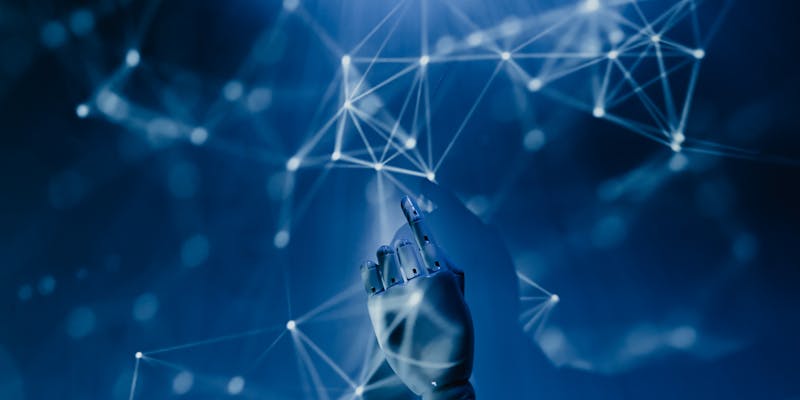Is It Easy to Learn Artificial Intelligence? What You Need to Know
Do you want to unlock the potential of cutting-edge technology to propel your business forward? Learning about artificial intelligence might be easier than you think. AI isn't just a fancy concept anymore; it's already a part of our daily lives at work and at home.
AI has a plethora of real-world applications that can boost your company's productivity and profitability. Let's examine artificial intelligence (AI) and how it can significantly advance your profession.
Artificial Intelligence: What to Know?
The field of computer science, known as artificial intelligence (AI), uses datasets and information technology to address a variety of problems. AI essentially comprises teaching machines to simulate human cognitive processes.
This gives gadgets human-like comprehension, learning, decision-making, and problem-solving abilities. Artificial intelligence-enabled gadgets can, therefore, interact with people in a variety of work and social settings.
How Can You Learn Artificial Intelligence?
This is a list of key essential procedures that will enable you to quickly understand AI.

Obtain the Required Skills
It's essential to acquire a few prerequisites before pursuing a career in artificial intelligence. Some important areas to concentrate on are as follows:
Elementary Algebra
Artificial intelligence, or AI, relies heavily on mathematics in its operations. You don't have to be an expert mathematician, although it is beneficial to grasp some fundamental ideas. For instance, you ought to be familiar with concepts like numbers, forms, and their relationships.
Algebra, which helps you solve issues with numbers and symbols; calculus, which helps you understand how things change over time; and probability, which helps you anticipate how probable something is to happen.
Fundamental Statistics
The main tasks of statistics are data collection, analysis, and interpretation. Since you'll be interacting with a lot of data in AI, comprehension of statistics is crucial. It should be able to help you identify trends or patterns in data. Additionally, you must be able to generalize conclusions or forecasts from the data using statistics.
A few key ideas in statistics are averages, which indicate the typical value of a collection of numbers; trends, which illustrate how data evolves over time; and probability, which indicates the likelihood that an event will occur given the available data.
Start Learning AI Skills
After you've mastered the foundations, it's time to explore the critical abilities required for AI. Being able to code is essential for creating AI algorithms, working with data, and building models. Another essential element is knowledge of data structures, which offer specific formats for effectively handling and organizing data. With this understanding, you may use various structures such as arrays, lists, and trees to create sophisticated AI models and algorithms.
Proficiency in data science is essential, covering a wide range of instruments and algorithms to identify patterns in unprocessed data. Possessing data science skills allows you to extract insightful information from large datasets, comprehend user requirements, and create powerful AI algorithms.
AI's foundational technology, machine learning, enables computers to learn from data, generating predictions and improving product performance. To succeed in AI, one must understand a variety of machine learning methods and how to use them. Deep learning, a branch of machine learning, uses complex neural networks to identify patterns in data and is frequently used in high-end AI applications like driverless cars.
Learn About the Programs and Tools Used by AI
Comprehending the fundamental AI tools and packages is crucial for achieving success in the domain. The AI community has come to rely on Python and R because of their ease of use and abundance of reliable tools and frameworks. Although fluency in both languages is not required, familiarity with important libraries and frameworks is.
NumPy, Scikit-learn, Pandas, TensorFlow, Seaborn, Theano, Keras, PyTorch, and Matplotlib are essential libraries for Python users. These tools, which provide features for data manipulation, machine learning algorithms, visualization, and other areas, simplify the process of developing artificial intelligence.
Benefits of Artificial intelligence (AI)
These are some noteworthy benefits of AI.

Reduction of Human Error
When AI is developed properly, it can minimize the likelihood of errors by basing judgments on obtained data and algorithms, which can greatly reduce errors and improve accuracy.
Zero Risks
AI technology enables people to give dangerous jobs to machines, like space exploration or bomb defusal. AI robots are able to reliably and precisely perform hazardous tasks because of their robust design and capacity to withstand hostile settings.
24x7 Availability
AI systems are able to work continuously without the need for breaks or downtime, unlike people. Artificial Intelligence (AI) can manage repeated jobs efficiently, assuring round-the-clock efficiency because of the increased processing speeds and multitasking capabilities.
Digital Assistance
AI-driven digital assistants enable smooth user interactions, doing away with the necessity for human involvement in a variety of jobs. These aides provide individualized support and on-demand access to knowledge; in conversations, they are frequently indistinguishable from humans.
Drawbacks of Artificial Intelligence
Despite its many benefits, AI has some cons as well.
Lack of Creativity
Although AI is capable of learning from historical facts and experiences, it is not able to think creatively or unconventionally. This drawback shows itself in activities that call for creative solutions, as AI may generate predictable results based only on pre-fed data.
Unemployment
The use of AI technology has raised concerns about job displacement and unemployment, especially in sectors like manufacturing. Although AI can increase productivity, there is a chance that it will eventually replace human labor, which could result in job losses in some industries.
Promotes Laziness
AI task automation may cause people to become less engaged cognitively. People may become overly dependent on technology as a result of AI managing repetitive activities and offering answers, which could erode critical thinking abilities and encourage reliance on AI systems.
The Bottom Line!
Artificial intelligence (AI) has a far greater influence than anything we have ever witnessed. It is profoundly transforming industries, altering our way of thinking, and reshaping our society. Furthermore, AI frequently makes better conclusions in particular scenarios than humans do. There are countless opportunities for innovation and advancement as long as we keep using artificial intelligence to its fullest.
On this page
Artificial Intelligence: What to Know? How Can You Learn Artificial Intelligence? Obtain the Required Skills Elementary Algebra Fundamental Statistics Start Learning AI Skills Learn About the Programs and Tools Used by AI Benefits of Artificial intelligence (AI) Reduction of Human Error Zero Risks 24x7 Availability Digital Assistance Drawbacks of Artificial Intelligence Lack of Creativity Unemployment Promotes Laziness The Bottom Line!Related Articles

Plaque Psoriasis Uncovered: A Comprehensive Guide
By - Rick Novak
Sep 04, 2024

The All-New Mazda CX-5: Jaw-Dropping and Out of Words Surprise!
By - Rick Novak
Apr 05, 2024

Affordable Living: Prefabricated Homes Could Be Cheaper than You Think
By - Rick Novak
Apr 05, 2024

Customer Service to Corporate Success: Navigating a Rewarding Career Path
By - Kelly Walker
Sep 06, 2024

Job Opportunities and Top Free Courses Available in Digital Marketing
By - Rick Novak
Apr 05, 2024

Is It Easy to Learn Artificial Intelligence? What You Need to Know
By - Rick Novak
Apr 06, 2024

Understanding the Appeal of Coworking Spaces and Shared Offices
By - Kelly Walker
Sep 05, 2024

The New Hyundai Santa Fe 2024 Will Revolutionize Driving in Miami
By - Rick Novak
Apr 04, 2024

The Truth About Payday Loans: Your Guide to Making Wise Choices
By - Rick Novak
Sep 06, 2024

Becoming a Digital Marketing Pro: In-Depth Insights into Leading Programs
By - Rick Novak
Sep 05, 2024

Cybersecurity Masters Programs and Marketing Automation Tools in 2024
By - Kelly Walker
Sep 06, 2024

The Grand Penny-Pincher's Guide to Event Management Success!
By - Rick Novak
Apr 04, 2024
